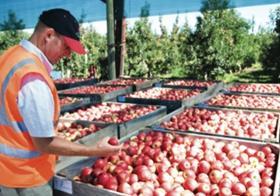
Control of New Zealand pipfruit industry giant Mr Apple is set to change hands following the collapse of its main investor South Canterbury Finance, which is now in receivership.
The country’s largest fully integrated pipfruit producer, Mr Apple is owned by Scales Holdings, which is in turn 80 per cent owned by South Canterbury Finance.
While there is uncertainty about the future ownership of the company, Mr Apple's general manager Andrew van Workum told Fruitnet.com he was confident the sale of shares in Scale Holdings would not signal a threat to the successful operation of Mr Apple in the future.
“It’s a good company and anyone who buys a company like Scales is wanting to see it grow. You buy companies with a positive attitude, not because you want to start making cutbacks.”
“It’s business as usual. Eighty per cent of Scales `Holdings` will get sold and Mr Apple is part of that package,” he added.
When South Canterbury Finance went into receivership in August, the government essentially took over control of the company, paying out NZ$1.6bn to cover cash owed to depositors and stockholders, and another NZ$175m to cover other debts.
Speaking at the time finance minister Bill English told Christchurch newspaper the Press that the move was intended to take the pressure off the receiver to quickly sell off any assets.
'This ensures the Crown can get the best deal for taxpayers. Businesses that are owned by South Canterbury Finance can continue to operate and there will be a minimum of disruption to both the local and national economy,” he said.
Fruitnet.com has received reports of anxiety in the industry over the sale, particularly in the Hawke’s Bay, where the majority of Mr Apple’s operations are based.
Currently it owns and operates 20 orchards, three packhouses and a cool store, and with staff numbers swelling to 1,700 in peak fruit picking season, Mr Apple is one of Hawke's Bay's biggest employers.
Hawke's Bay Fruitgrowers Association president Leon Stallard told the Dominion Post it was possible the company could be split up as some of its orchards were 'not in the most desirable `apple growing` areas.”
'It's a good business, well run with very good processes which achieve excellent crops. It's a stalwart in the industry and I just hope whoever buys it continues with that commitment,' he added.



